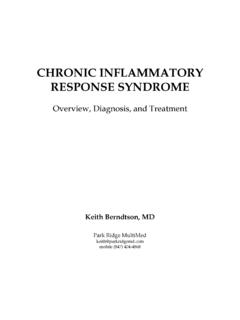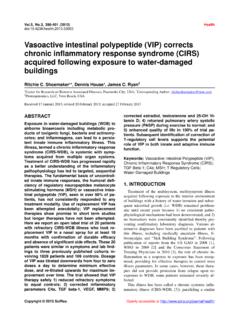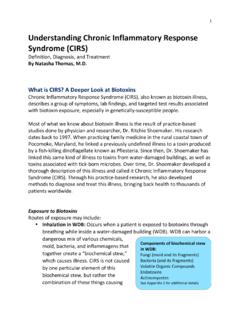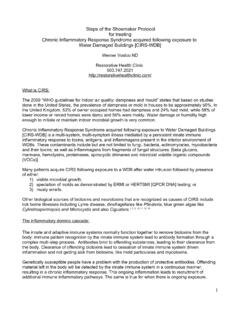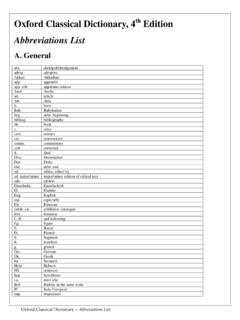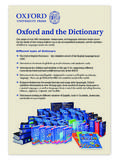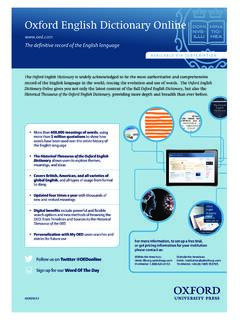Transcription of The oxford dictionary definition for evidence is
1 Tessier 1 evidence Based Medicine Essay Lauren Tessier, ND evidence based medicine (EBM) is a model of practice many physicians claim to practice by, and understandably so. After all, at face value, EBM seems to display a certain unwavering quality; inferring immunity to ignorance as granted by empirically validated clinical trials. The oxford dictionary definition for evidence is the available body of facts or information indicating whether a belief or proposition is true or valid 1. Moreover, the definition of medicine is the science or practice of the diagnosis, treatment, and prevention of disease 2.
2 Therefore, one can conclude that EBM is defined as disease prevention, identification and management as validated by the information amassed through the process of scientific investigation. With such strong focus on and desire for an ironclad, litigious-proof means of practicing, one should wonder to where the art of medicine has disappeared. One of the major proponents and founders of EBM, David Sackett, describes EBM as the conscientious, explicit and judicious use of current best evidence in making decisions about the care of individual patient 3.
3 Such definition should resonate with any practitioner who has taken the Hippocratic oath. However, in the current medical paradigm in which we practice, it seems as though the words judicious and individual have been cast aside in the face of absolute treatment algorithms. These cookie-cutter approaches to case management have seemingly developed in response to the litigious nature of our society. Or at least, that is what it appears to have occurred. Thankfully, a physician may claim ownership to the words judicious and individual once again, if the art of medicine is embraced over the obdurate pragmatism that has become EBM.
4 However, let us not completely disregard the entirety of EBM, but instead elucidate its benefits and pitfalls. The original intention of EBM was to optimize clinical practice as to pair current empirically founded scientific evidence with safe, consistent care4. Such measures were achieved by creating standards for developing and publishing research5, as well as creating databases wherein information could be summarized6 and standards of care and practice guidelines could be made available to the practicing physician7. It can therefore be stated that EBM has offered the practicing physician invaluable information for case management.
5 Such standards of care are algorithmic extrapolations developed by the meta-analyses of numerous scientific studies. The included studies typically consist of large populations in which variables are either controlled for, or avoided whilst determining study participant population. Such large-scale studies require much capital, time, and man power. It is clear why medical professionals are so inclined to rely on the data generated by such studies. However, in the strengths also lie the weaknesses. Standards of care are widely applied and thus may become overly relied upon for case management.
6 However not all patient presentations are able to be properly and safely managed by statically adjusted algorithms. Judiciousness and prudent, individualized, contextual critical thinking are all but lost. The result of which may both be detrimental to the patient and to the practitioner s liability and enjoyment of the practice and art of medicine. When EBM first came about, many were concerned Tessier 2 that knowledge of basic sciences and the skill developed through years of clinical practice would be severely undervalued and underutilized8.
7 Moreover, concerns about being guideline driven, rather than investigation driven, could find a clinician missing important signs or symptoms of other concurrent health issues9. Both concerns regarding EBM are valid, and may not necessarily apply to a physician who is truly practicing the art of medicine, rather adhering to intransigent standards of care. Large scale studies are widely considered to be the most reliable source of information, as they can offer a clearer picture of statistical significance of the data, after controlling for variables.
8 However, in having the ability to choose a large sample size, small but perhaps important clinical variations are able to be disregarded. The implications of such were foreseen by the initial critics of EBM. They foresaw that such limited inclusion criteria may not be of benefit to real-life cases, and to those populations not represented by said clinical trial populations8. In the world of EBM, capital, time, and man power allows for stringent oversight of many aspects of research. Firstly, it allows for the ability to collect participants based on strict inclusion criteria, once again avoiding the cases that are outliers.
9 This process also allows researchers to choose those most likely to respond to treatment. Additionally, it allows for those with vested interest to pre-determine interventions, controls, and end points of studies. Lest we fail to acknowledge that undesirable outcomes may also be omitted from publication at the determination of the vested party 10. Having reflected upon the aforementioned, shouldn t one be concerning themselves with the clinical detriments of overly stringent practice guidelines or entirely generalized standards of care?
10 Unfortunately, many physicians are too busy, have poor access to information, are ill equipped, or are unaware of the proper way by which to analyze scientific data. Instead, physicians today relay on news blurbs, automated point of care templates, position statements, and standards of care offered by various associations. It should be noted that it is not uncommon for standards of care to differ depending on their source. Such recent examples include but are not limited to timing of initiation of HIV screening 11 and periodicity of pelvic exams 12.
